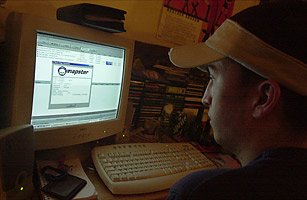
At the turn of this century, there were pretty much two ways to get music: watch MTV (when it played music) or shell out nearly 20 bucks for a CD. Enter Shawn Fanning, a Northeastern University student who invented Napster, a computer program that allowed users to share songs over the Internet. Music was suddenly everywhere, and it was all free. In one of the first great battles over intellectual property in the Internet era, mega-metal band Metallica sued Napster for copyright infringement. But college students had more immediate concerns. Colleges began banning Napster, because the website's file sharing used up all available bandwidth. CNN reported in 2001 that 34% of U.S. colleges and universities had banned Napster, and in the summer of 2001, free Napster came to an end. The party didn't die, however; knockoffs such as Bearshare and Limewire were slow and clumsy, but the music was still free. The 2008 Digital Millennium Copyright Act banned all illegal file sharing and levied fines of up to $30,000 for each downloaded song. Schools then installed blocking software, ending file sharing's 10-year run.